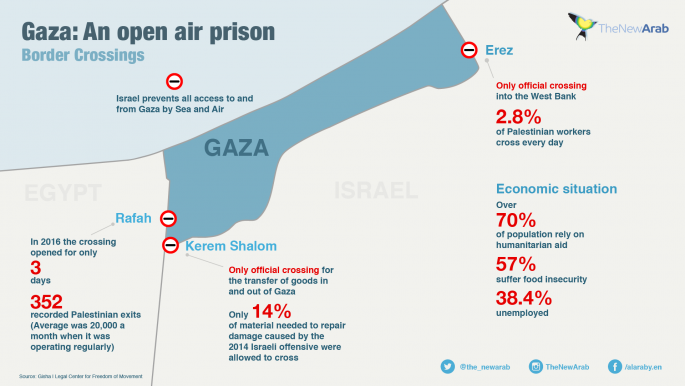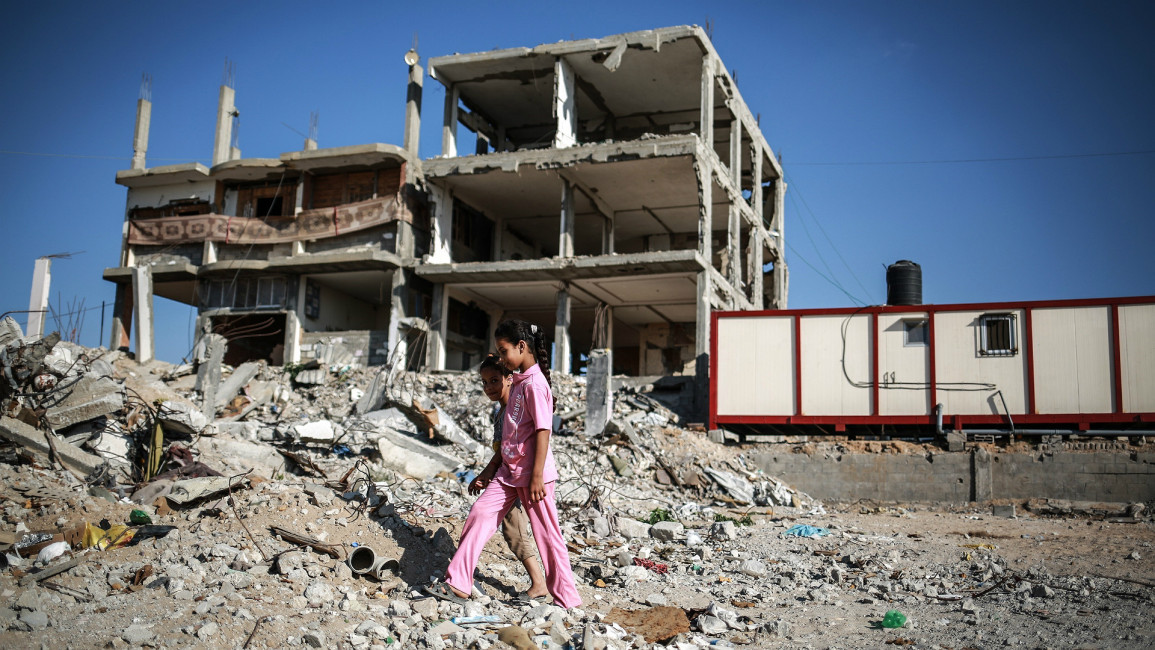Gulf donors still falling short on Gaza reconstruction promises
Qatar, the United Arab Emirates and other Arab donors have only delivered only a small fraction of what was promised in reconstruction aid for Gaza following the 2014 war, a new report by the World Bank had found.
"Actual disbursements fall short of planned disbursements by around $1.3 billion," the report said.
If the flow of funding continues at the current pace, it added, pledges will not be fulfilled until mid-2019, some two years behind schedule.
Israel launched the war in July 2014 in what it said was a campaign to halt heavy rocket fire from the territory.
During 51 days of fighting, more than 2,200 Palestinians were killed; more than half of them civilians. Seventy-three people, including six civilians, were killed on the Israeli side.
The fighting also inflicted heavy damage on Gaza, destroying some 171,000 homes. At least 75,000 people still remain homeless.
 |
Qatar has only delivered 15 percent of what was promised, Saudi Arabia only 10 percent and Kuwait has delivered nothing |  |
At the 2014 conference in Cairo, the international community pledged some $3.51 billion in aid over three years to rebuild Gaza.
But according to Monday's report, as of the end of March, $1.41 billion has been delivered, compared with $2.71 billion that should have arrived based on the original schedule.
Qatar led the list of donors in 2014, pledging $1 billion. The energy-rich country's foreign minister at the time, Khalid bin Mohammed al-Attiyah, denounced the "international silence" that surrounded Gaza's destruction.
"While the Palestinian people need financial support, they need more political support from the international community," he said at the time.
Yet a year and half later, Qatar has only delivered $152 million, or 15 percent of what was promised, according to the World Bank.
Saudi Arabia, the number two donor, has delivered just over 10 percent of the $500 million it pledged, while the United Arab Emirates has sent just 15 percent of the $200 million it promised.
Kuwait has delivered none of the $200 million it pledged.
Turkey has delivered about one-third of the $200 million it pledged.
The World Bank released its report a day before a gathering of international donor countries in Brussels, sending the meeting a stark message that donations are well behind the schedule set when pledges were made at an international conference in October 2014.
| Read also: Arab billionaires feel the heat of 2016 |
Palestinian economy suffering
In addition to the lack of aid, the report also found that the Palestinian economy is losing hundreds of millions of dollars every year due to outdated or insufficiently enforced fiscal agreements with Israel.
The lost revenue of $285 million annually was equivalent to 2.2 percent of Palestinian Gross Domestic Product, according to the report.
 |
The lost revenue of $285 million annually was equivalent to 2.2 percent of Palestinian Gross Domestic Product |  |
The Ramallah-based Palestinian Authority "suffers from substantial revenue losses under the current revenue sharing arrangements outlined by the Paris Protocol", the report said of the 1994 agreement which governs economic ties between Israel and the occupied Palestinian territories.
It said most of the losses were a result of "tax leakages on bilateral trade with Israel in addition to undervaluation of Palestinian imports from third countries".
The World Bank also noted the handling fees Israel takes for imports en route to the Palestinians, which at the current rate of three percent "significantly outstrips costs incurred [by Israel] to handle Palestinian imports", recommending that the rate be reduced to 0.6 percent.
The Palestinian Authority has also so far failed to open a "dedicated fund" to receive $669 million in pension payments collected by the Israeli government for Palestinians working in Israel.
| Read also: Israel is uprooting West Bank's future |
The World Bank noted recent meetings between Israeli and Palestinian finance ministers, and Israel's commitment to transfer $128 million to "offset some of the PA's losses", calling it "highly encouraging as a first step".
"Reviving the Israeli-Palestinian Joint Economic Committee, originally set to monitor implementation of the Paris Protocol and resolve outstanding issues, could significantly enhance economic and fiscal cooperation between the parties," said the World Bank in a statement.
Resolving outstanding financial "issues" between Israel and the Palestinians could not only "ease the PA's fiscal stress" and improve its economy but might even "facilitate progress on the political front", the report said.
 |



